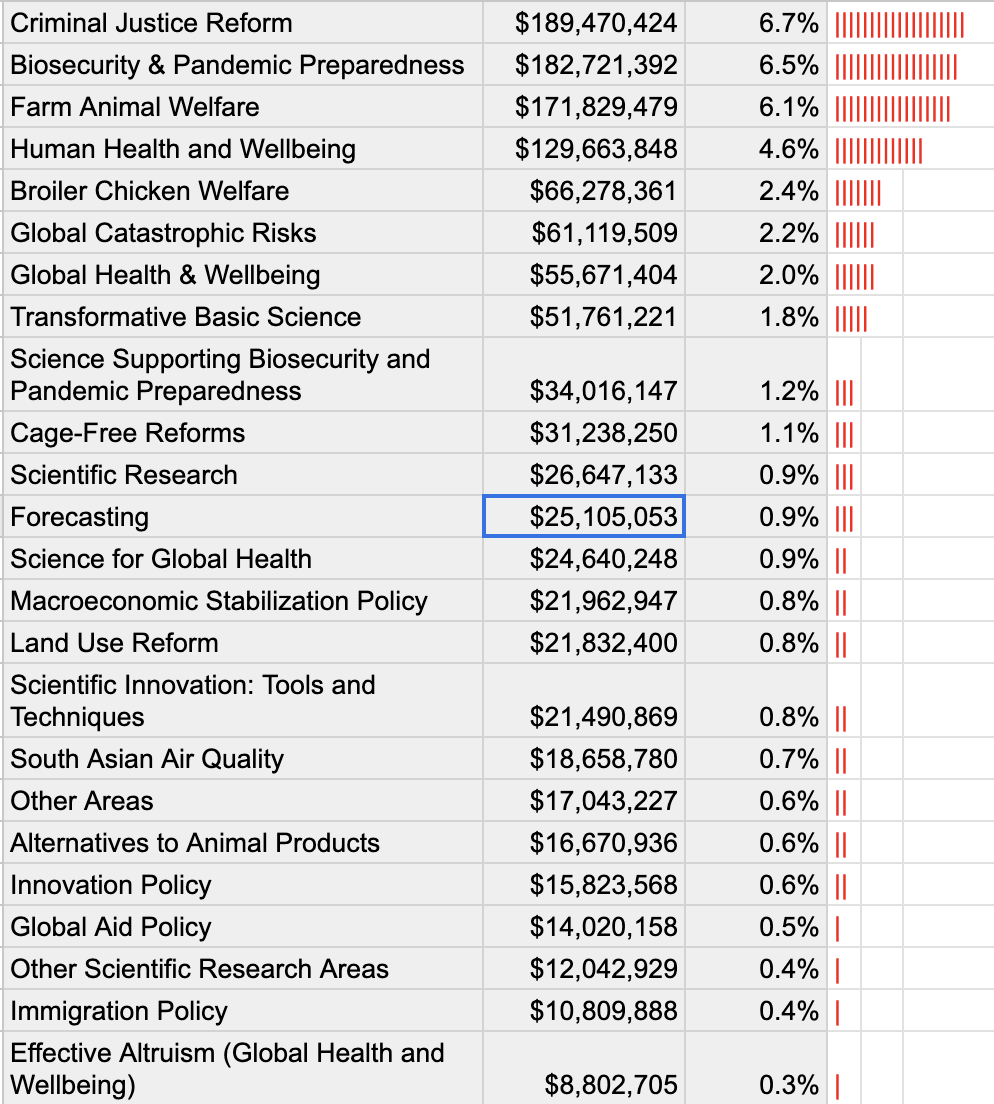Written by Benjamin Tereick
Edit: several comments here question the value of forecasting as a philanthropic cause — see this comment for a reply.
We are happy to announce that we have added forecasting as an official grantmaking focus area. As of January 2024, the forecasting team comprises two full-time employees: myself and Javier Prieto. In August 2023, I joined Open Phil to lead our forecasting grantmaking and internal processes. Prior to that, I worked on forecasts of existential risk and the long-term future at the Global Priorities Institute. Javier recently joined the forecasting team in a full-time capacity from Luke Muehlhauser’s AI governance team, which was previously responsible for our forecasting grantmaking.
While we are just now launching a dedicated cause area, Open Phil has long endorsed forecasting as an important way of improving the epistemic foundations of our decisions and the decisions of others. We have made several grants to support the forecasting community in the last few years, e.g., to Metaculus, the Forecasting Research Institute, and ARLIS. Moreover, since the launch of Open Phil, grantmakers have often made predictions about core outcomes for grants they approve.
Now with increased staff capacity, the forecasting team wants to build on this work. Our main goal is to help realize the promise of forecasting as a way to improve high-stakes decisions, as outlined in our focus area description. We are excited both about projects aiming to increase the adoption rate of forecasting as a tool by relevant decision-makers, and about projects that provide accurate forecasts on questions that could plausibly influence the choices of these decision-makers. We are interested in such work across both of our portfolios: Global Health and Wellbeing and Global Catastrophic Risks. [1]
We are as of yet uncertain about the most promising type of project in the forecasting focus area, and we will likely fund a variety of different approaches. We will also continue our commitment to forecasting research and to the general support of the forecasting community, as we consider both to be prerequisites for high-impact forecasting. Supported by other Open Phil researchers, we plan to continue exploring the most plausible theories of change for forecasting. I aim to regularly update the forecasting community on the development of our thinking.
Besides grantmaking, the forecasting team is also responsible for Open Phil’s internal forecasting processes, and for managing forecasting services for Open Phil staff. This part of our work will be less public, but we will occasionally publish insights from our own processes, like Javier’s 2022 report on the accuracy of our internal forecasts.
- ^
It should be noted that administratively, the forecasting team is part of the Global Catastrophic Risks portfolio, and historically, our forecasting work has had closer links to that part of the organization.


I‘m really excited about more thinking and grant-making going into forecasting!
Regarding the comments critical of forecasting as a good investment of resources from a world-improving perspective, here some of my quick thoughts:
Systematic meritocratic forecasting has a track record of outperforming domain experts on important questions - Examples: Geopolitics (see Superforecasting), public health (see COVID), IIRC also outcomes of research studies
In all important domains where humans try to affect things, they are implicitly forecasting all the time and act on those forecasts. Random examples: - "If lab-grown meat becomes cheaper than normal meat, XY% of consumers will switch" - "A marginal supply of 10,000 bednets will decrease malaria infections by XY%" - Models of climate change projections conditional on emmissions
In many domains humans are already explicitly forecasting and acting on those forecasts - Insurance (e.g. forecasts on loan payments) - Finance (e.g. on interest rate changes) - Recidivism - Weather - Climate
Increases in use of forecasting has the potential to increase societal sanity - Make people more able to appreciate and process uncertainty in important domains - Clearer communication (e.g. less talking past one another by anchoring discussion on real world outcomes) - Establish feedback loops with resolvable forecasts ➔ stronger incentives for being correct & ability to select people who have better world models
That said, I also think that it's often surprisingly difficult to ask actionable questions when forecasting, and often it might be more important to just have a small team of empowered people with expert knowledge combined with closely coupled OODA loops instead. I remember finding this comment from Jan Kulveit pretty informative:
Source: https://ea.greaterwrong.com/posts/by8u954PjM2ctcve7/experimental-longtermism-theory-needs-data#comment-HgbppQzz3G3hLdhBu
I agree that things like confirmation bias and myside bias are huge drivers impeding "societal sanity". And I also agree that it won't help a lot here to develop tools to refine probabilities slightly more.
That said, I think there is a huge crowd of reasonably sane people who have never interacted with the idea of quantified forecasting as a useful epistemic practice and a potential ideal to thrive towards when talking about important future developments. Like other commentators say, it's currently mostly attracting a niche of people who thrive for higher ... (read more)